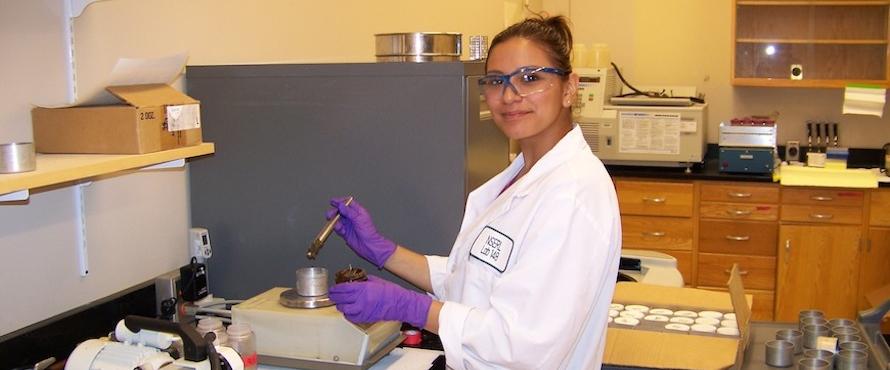News & Features
Building relationships has helped bridge the gap between an education in theory and one in practice for Northeastern earth science students. Faculty in the earth science department have reached out to local and national agencies and organizations in order to provide internships and field opportunities for their students. These hands-on experiences have brought to life the concepts learned in textbooks and discussed in the classroom.
Four Northeastern undergraduates spent the summer interning at the U.S. Department of Agriculture’s National Soil Erosion Research Laboratory (NSERL) in West Lafayette, Ind., researching methods to prevent accelerated soil erosion.
“They are getting major research experience and learning techniques we don’t have the resources to teach here,” Jean Hemzacek, instructor, earth science, said.
Laura Sanders, professor, earth science, added that the students are working to find answers to real problems.
The faculty in earth science first connected with NSERL in summer 2011 to create an opportunity called the Tierra Project. Like NSERL, Tierra provides Northeastern students a paid summer research experience
To help facilitate the development of the Tierra Project, Northeastern earth science faculty forged relationships with the nearby North Park Village Nature Center, as well as other farms and laboratories. For 10 weeks during the summer, earth science faculty members utilize these spaces for research projects with students enrolled in an earth science First Year Experience class.
These opportunities have allowed students to learn alongside researchers in the field. Kenneth Voglesonger, assistant professor, earth science, explained how students have been able to see scientists in a new light.
“Our students saw people who were scientists, but weren’t wearing a lab coat and being stuffy,” Voglesonger said. “They were genuine people who took the time to interact with our students, and I think that meant a lot to them.”
The students are also learning skills they would not be able to acquire in a classroom setting. Colleen Schwartz, earth science student, is learning new techniques by aiding in the construction of a flume, a large artificial water channel.
“I've used a bunch of power tools already, which is exciting since no one at home generally trusts me with tools that are capable of cutting through giant pipes,” Schwartz said.
Earth science student Cindy Calderon spent a summer studying rock samples in the boiling Rattlesnake Hills of Wyoming, a place she may never have experienced without the opportunity provides through her department.
With all of this research experience comes research findings. Many of the students present their research at regional and national conferences. In these settings, Northeastern students discover their worth, rubbing shoulders with peers from across the nation.
“I think these conferences are life changing for most of our students,” Voglesonger said. “They present their research to peers and researchers from other institutions, and I’ve heard professors and people from federal agencies say, ‘We want students like you!’”








